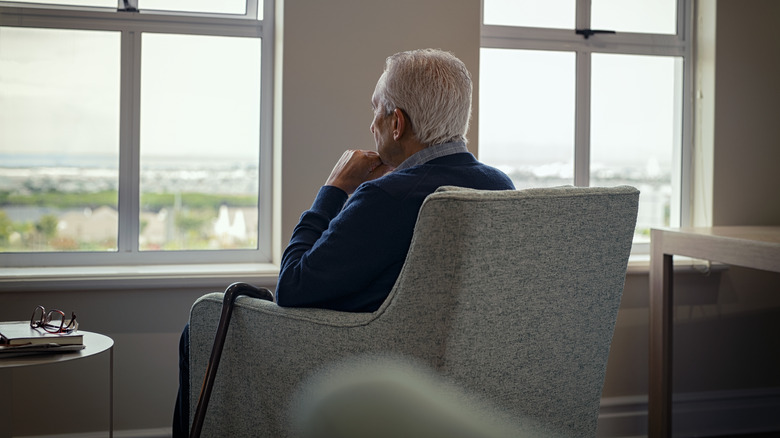How Loneliness Can Increase Death Risk In People With Heart Conditions
During the holiday season, people gather with their families and friends for parties to make special memories that last a lifetime. There are, however, many people who feel lonely and alone this holiday season, and they may have felt that way for most of the year. We all feel lonely from time to time, but what is loneliness exactly? Loneliness can be described as a disconnect between what people expect from their relationships and what they are actually receiving (per UChicagoMedicine).
When you see someone surrounded by people, you might think that they couldn't possibly be lonely. However, it's possible to feel lonely even when surrounded by others because loneliness is considered a state of mind. It's estimated that one in three Americans experience loneliness, and one in 12 Americans experience severe loneliness, making it extremely common.
Humans are naturally social creatures that long for connection with others. We are so hard-wired to be social that those who are isolated from social settings may face negative psychological consequences. For example, isolation may feel as deeply painful as physical pain, according to a 2021 article published in Evolutionary Psychology Meets Neuroscience. Interestingly, further research discovered that social pain appears to activate the same neural networks in the brain that physical pain does (per ScienceDaily).
Loneliness may affect physical health just as much as psychological health. Many are curious about how loneliness affects the mortality risk of people with cardiovascular disease, and budding research may have some answers.
How loneliness can increase chance of death in those with heart problems
The leading cause of death worldwide is cardiovascular disease, resulting in 18.56 million worldwide deaths in 2019 (per Our World in Data). Because aging alters the heart and blood vessels, many individuals who have a heart condition are 65 or older, according to the National Institute on Aging. In general, some people who are older are also more likely to live alone, per Pew Research Center, which might contribute to an increased chance of experiencing loneliness.
In a recent meta-analysis published in the January 2023 edition of Psychosomatic Medicine, the researchers sought to examine the relationship between how living alone, experiencing social isolation, and loneliness impacts the mortality risk of individuals with cardiovascular disease. In total, 35 studies from North America, Europe, and Asia were analyzed. The researchers discovered that individuals who lived alone and were socially isolated had a higher mortality risk from any cause, including cardiovascular diseases.
The findings of this study appear to showcase the necessity of social support for individuals with cardiovascular disease. "Our review found that each of these factors are critically important to consider in the treatment of cardiovascular disease, as increased levels of loneliness, social isolation and living alone appears to lead to premature death," reported Róisín Long, clinical psychologist and lead author of the study, in a news release (per U.S. News & World Report).


